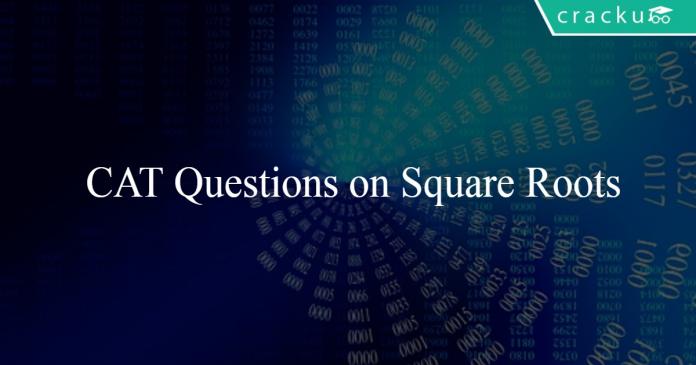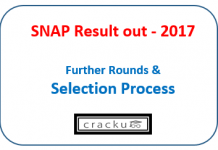CAT Questions on Square Roots
Download important Square Roots Questions for CAT PDF based on previously asked questions in CAT exam. Practice Square Roots Questions PDF for CAT exam.
Download CAT Questions on Square Roots
CAT Crash Couse – Sufficient To Crack The Exam
Download CAT Quant Questions PDF
Take 3 Free Mock Tests for CAT
Question 1: Let $x = \sqrt{4+\sqrt{4-\sqrt{4+\sqrt{4- \ to \ infinity}}}}$. Then x equals
a) 3
b) $(\sqrt{13} – 1)/2$
c) $(\sqrt{13} + 1)/2$
d) $\sqrt{13}$
Question 2: $(\sqrt{\frac{225}{729}}-\sqrt{\frac{25}{144}})\div\sqrt{\frac{16}{81}}=?$
a) $\frac{5}{16}$
b) $\frac{7}{12}$
c) $\frac{3}{8}$
d) None of these
Question 3: What is the value of $\sqrt{\frac{a}{b}}$, If $\log_{4}\log_{4}4^{a-b}=2\log_{4}(\sqrt{a}-\sqrt{b})+1$
a) -5/3
b) 2
c) 5/3
d) 1
Question 4: $2-\frac{\sqrt{6407522209}}{\sqrt{3600840049}}=$
a) 0.666039
b) 0.666029
c) 0.666009
d) None of the above
Question 5: The value of $\log_{0.008}\sqrt{5}+\log_{\sqrt{3}}81-7$ is equal to
a) 1/3
b) 2/3
c) 5/6
d) 7/6
Take 3 free mock tests for CAT
Download CAT Quant Questions PDF
Question 6: The highest number amongst $\sqrt{2}, \sqrt[3]{3},$ and $\sqrt[4]{4}$ is
a) $\sqrt{2}$
b) $\sqrt[3]{3}$
c) $\sqrt[4]{4}$
d) All are equal
Question 7: The simplest value of the expression $(\frac{4^{p+\frac{1}{4}}\times \sqrt{2 \times 2^{p}}}{2\times \sqrt{2^-p}})^\frac{1}{p}$
a) 4
b) 8
c) 4p
d) 8p
Question 8: The value of x for which the equation $\sqrt{4x – 9}$ + $\sqrt{4x + 9}$ = 5 + $\sqrt{7}$ will be satisfied, is:
a) 1
b) 2
c) 3
d) 4
Question 9: The value of $\text{log}_{7} \text{log}_{7} \sqrt{7(\sqrt{7\sqrt{7}})}$
a) 7
b) $\text{log}_7$ 2
c) $1-3 \text{log}_2$ 7
d) $1-3 \text{log}_7$ 2
Question 10: $log_{13} log_{21} (\sqrt{x+21}+ \sqrt{x} ) =0 $ then the value of x is
a) 21
b) 13
c) 81
d) None of the above
Download CAT Quant Questions PDF
Answers & Solutions:
1) Answer (C)
$x = \sqrt{4+\sqrt{4-\sqrt{4+\sqrt{4- \ to \ infinity}}}}$
=> $x = \sqrt{4+\sqrt{4-x}}$
=> $x^2 = 4 + \sqrt{4-x}$
=>$x^4 + 16 – 8x^2 = 4 – x$
=> $x^4 – 8x^2 + x +12 = 0$
On substituting options, we can see that option C satisfies the equation.
2) Answer (A)
$(\sqrt{\frac{225}{729}}-\sqrt{\frac{25}{144}})\div\sqrt{\frac{16}{81}}=x$ This can be simplified as
$(\frac{15}{27}-\frac{5}{12})\div\frac{4}{9}=x$
$(\frac{5}{36})*\frac{9}{4}=x$
x=$\frac{5}{16}$. Hence, option A is the correct answer.
3) Answer (C)
$\sqrt{\frac{a}{b}}$, If $\log_{4}\log_{4}4^{a-b}=2\log_{4}(\sqrt{a}-\sqrt{b})+\log_{4}{4}$
i.e. $\log_{4}\log_{4}4^{a-b}=\log_{4}((\sqrt{a}-\sqrt{b})^2)*4$
i.e. $\log_{4}4^{a-b}=((\sqrt{a}-\sqrt{b})^2)*4$
i.e. (a-b)*$\log_{4}4=((\sqrt{a}-\sqrt{b})^2)*4$
i.e. a-b = 4a+4b-8$\sqrt{ab}$
i.e. 3a + 5b – 8$\sqrt{ab}$ = 0
i.e. $3\sqrt\frac{a}{b}^2$ – 8$\sqrt\frac{a}{b}$+5 = 0
put $\sqrt\frac{a}{b}$ = t
therefore 3$t^2$ – 8t + 5 = 0
solving we get t = 1 or t = $\frac{5}{3}$
i.e. $\sqrt\frac{a}{b}$ = 1 or $\frac{5}{3}$
but if $\sqrt\frac{a}{b}$ = 1 then a=b then $\log_{4}(\sqrt{a}-\sqrt{b})$ will become indefinite
Therefore $\sqrt\frac{a}{b}$ = $\frac{5}{3}$
Therefore our answer is option ‘C’
4) Answer (A)
$2-\frac{\sqrt{6407522209}}{\sqrt{3600840049}}=2-\frac{80047}{60007}$
=$2-1.3339610$
$=0.666039$
Therefore, option A is the right answer.
5) Answer (C)
$\log_{0.008}\sqrt{5}+\log_{\sqrt{3}}81-7$
$81 = 3^4$ and $0.008 = \frac{8}{1000} = \frac{2^{3}}{10^{3}} = \frac{1}{5^{3}} = 5^{-3} $
Hence,
$\log_{0.008}\sqrt{5}+ 8 -7 $
$ \log_{5^{-3}}5^{\frac{1}{2}}+ 8 -7 $
$\frac{log 5^{0.5}}{log 5^{-3}} + 1$
$ – \frac{1}{6} + 1$
= $\frac{5}{6}$
Free CAT Practice – Study Material
Download CAT Quant Formulas PDF
6) Answer (B)
Given that
a = $\sqrt{2}, b = \sqrt[3]{3},$ and c = $\sqrt[4]{4}$
a = $(2)^{\frac{1}{2}}$, b = $(3)^{\frac{1}{3}}$ and c = $(4)^{\frac{1}{4}}$
Taking log both sides $\log_{}{a}$ = $\log_{}{(2)^{1/2}}$ , $\log_{}{b} = \log_{}{(3)^{1/3}}$ , $\log_{}{c} = \log_{}{(4)^{1/4}}$
we know that ($\log_{}{2}$ = 0.3010 , $\log_{}{3}$ = 0.4771 , $\log_{}{4}$ = $2\log_{}{2}$ =0.6020)
Substituting these values
$\log_{}{a}$ = $\frac{1}{2}$*0.3010 , $\log_{}{b}$ =$\frac{1}{3}$*0.4771 , $\log_{}{c}$= $\frac{1}{4}$*0.6020
$\log_{}{a}$ = 0.1505 , $\log_{}{b}$ = 0.1590 , $\log_{}{c}$= 0.1505
We know that if $A_{1}$ > $A_{2}$ > $A_{3}$ > 1 Then $log_{}{A_{1}}$ > $log_{}{A_{2}}$ > $log_{}{A_{3}}$
Here clearly $log_{}{b}$ > $log_{}{a}$ = $log_{}{c}$ hence we can say that b = $\sqrt[3]{3}$ is the highest number among all.
Alternate method:
a = $\sqrt{2}, b = \sqrt[3]{3},$ and c = $\sqrt[4]{4}$
$a^{12} = 2^6, b^{12} = 3^4, c^{12} = 4^3$
$a^{12} = 64, b^{12} = 81, c^{12} = 81$
We can see that $b^{12}$ > $c^{12}$ = $a^{12}$
Also, a, b, c > 1. Hence, we can say that b > a = c.
*** Point to remember —— $\sqrt[N]{N}$ is highest for N=3 (N being natural number) ***
7) Answer (B)
Simplifying the surds, and writing everything on numerator we get:
= ${(2^{2p + 1/2 + 1/2 + p/2 – 1 + p/2}})^{1/p}$
= ${(2^{3p}})^{1/p}$
= $2^{3}$ = 8
8) Answer (D)
This question can be solved with the help of options easily.
We can say that 4x – 9 $\geq$ 0. Hence x $\geq$ 2.25. Now we can check option C and D.
Option C: $\sqrt{4x – 9}$ + $\sqrt{4x + 9}$ = $\sqrt{3}$ + $\sqrt{21}$ Which is not same as what we have in the question. Hence, this is not the correct answer.
Option D: $\sqrt{4x – 9}$ + $\sqrt{4x + 9}$ = $\sqrt{7}$ + $\sqrt{25}$ = 5 + $\sqrt{7}$. Which is the same as what we have in the question. Hence, we can say that option D the correct answer.
9) Answer (D)
$\text{log}_{7} \text{log}_{7} \sqrt{7(\sqrt{7\sqrt{7}})}$
= $\text{log}_{7} [\frac{1}{2} (\text{log}_{7} 7+\text{log}_{7} \sqrt{7(\sqrt{7})})]$
= $\text{log}_{7} [\frac{1}{2} (1 +\frac{1}{2}\text{log}_{7}{7(\sqrt{7})})]$
= $\text{log}_{7} [\frac{1}{2} (1 +\frac{1}{2}(1+1/2))]$
= $\text{log}_{7}\frac{7}{8}$
= $\text{log}_{7}7 – \text{log}_{7}8$
= $1-3 \text{log}_{7}2$
Hence, option D is the correct answer.
10) Answer (D)
$log_{13} log_{21} (\sqrt{x+21}+ \sqrt{x} ) =0 $
Thus, $log_{21} (\sqrt{x+21}+ \sqrt{x} ) = 1 $
Thus, $(\sqrt{x+21}+ \sqrt{x} ) = 21 $
Let, $\sqrt{x} = t$
Thus, $x = t^2$
Thus, $x+21 = t^2+21$
Thus, $\sqrt{t^2+21}+t = 21$
Thus, $(t^2+21) = (21-t)^2$
=> $t^2 + 21 = 441 – 42t + t^2$
=> $42t = 420$
Hence, $t = 10$
Hence, option D is the correct answer.
Download CAT Previous Papers PDF
Download Free CAT Preparation App
We hope this Square Roots Questions PDF for CAT with Solutions will be helpful to you.





![CAT Averages Questions PDF [Important Questions] CAT AVERAGES Questions PDF](https://cracku.in/blog/wp-content/uploads/2022/07/CAT-AVERAGES-Questions-PDF-218x150.png)